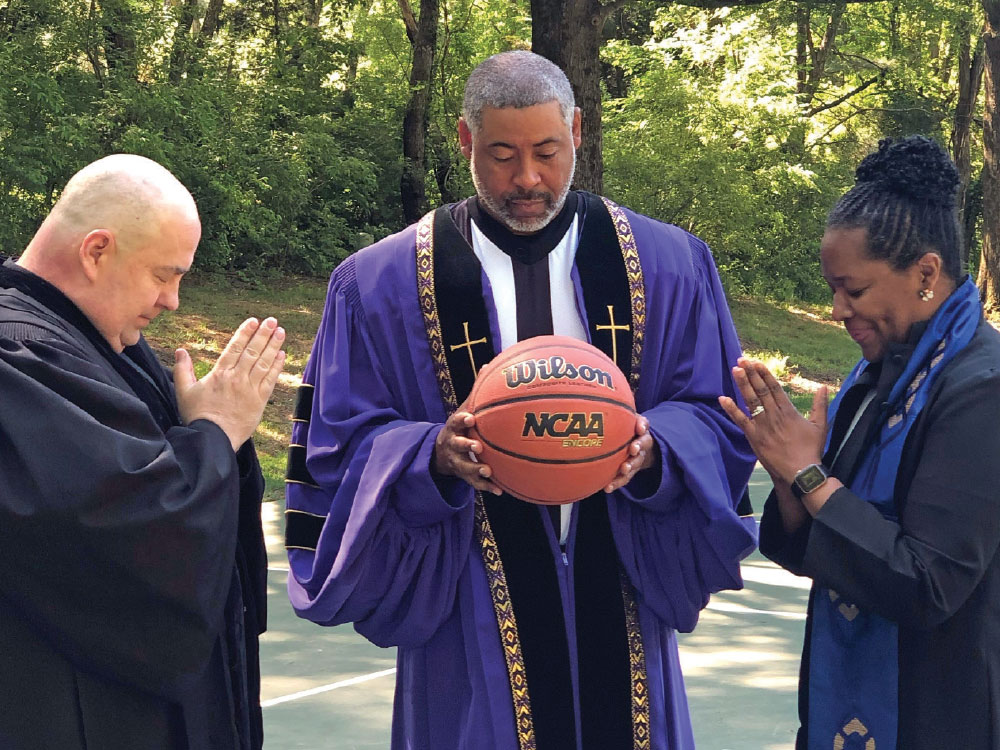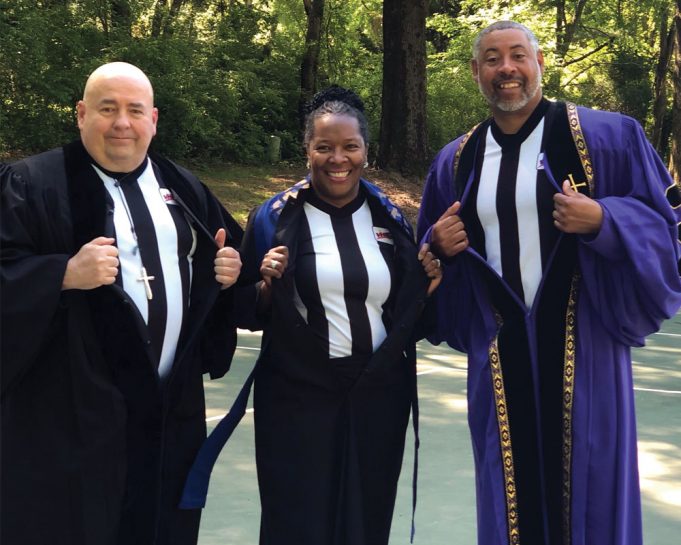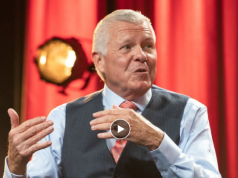A
s COVID-19’s reach expanded globally during the spring of 2020, people and the organizations of which they were members scrambled to adjust to everything from an avalanche of job losses to illnesses and, in some heartbreaking cases, deaths of family members and friends.
One wouldn’t normally think of an officiating association as an organization equipped to or capable of providing its members with this kind of support during those turbulent and dismal months, particularly when one of the pandemic’s first major U.S. casualties was organized sports at all levels. What’s the purpose of an officiating association when there’s nothing to officiate?
At least one association did, in fact, have a structure in place to provide valuable member support even as gyms were darkened and ballfields sat empty nationwide. Northern Virginia’s Cardinal Basketball Officials Association (CBOA), also IAABO Board #255, “an organization of amateur basketball officials from all walks of life” according to its website, has a four-member Chaplain Team — active since 2016 — that provides members with pastoral care in good times and bad.
The members of the Chaplain Team, seminarians all, are trained and experienced at providing pastoral care, which can include activities such as hospital visits, attendance at funerals/viewings and counseling. One of the primary tenets of pastoral care is the need to set aside one’s own desires in order to serve others.
“They are a tremendously diverse group and you can feel comfortable with any one of them,” explained CBOA member Jerry Caruso, who participated in the program following a cancer diagnosis. “When you are going through that, it is great to know you have people behind you.”
“There was certainly more need for pastoral care this past year than there had been previously, probably twice as much,” said Chaplain Team member Derek Shackleford, who holds both a master’s and doctorate degree in ministry from the Wesley Theological Seminary. Shackleford has also accomplished college basketball’s unofficial “triple crown,” having played, coached and now officiated at that level.
“COVID’s immediate impact on our people was two-fold,” he continued. “The first part was that the normality of officiating was suddenly absent while the other part of it was that life still happened. Employment, family situations, health, were all impacted by COVID to some extent.”
Scott Bach-Hansen is a CBOA officer and a 30-year basketball official who also manages replay equipment courtside for the NBA at Washington Wizard home games. A few years ago, the CBOA board began noticing a number of officials asking for assignment changes in order to care for relatives or attend funerals while other officials were “off the scheduling radar” for an extended period of time as they dealt with a family member’s long-term illness or end-of-life issues.
Bach-Hansen noted the CBOA membership included one ordained Catholic priest and three officials (himself included) who were seminary-trained to provide pastoral care. The seminarians all believed it would be helpful to form a Chaplain Team to support the association. The idea became reality during the next board meeting and the team has been active ever since.
“One of our officials was scheduled for an important evaluation game but had to the decline the assignment because a parent had passed away,” recalled Chaplain Team member Audrey Price. She holds a doctorate in theology from the Catholic University of America and was serving as a CBOA board member when the pastoral care concept was introduced. “We thought it would be a good idea if we had a more organized way to be present for officials in those moments.”
Some may question whether pastoral care is something an officiating association should provide. Some members may prefer their association limit its non-officiating scope and serve exclusively as a clearinghouse for game assignments and a place to discuss the intricacies of the block-charge dilemma.
Others view their relationship with their association and its members differently; veteran officials who find themselves on the same crew dozens of times over the years may begin to view their counterparts as extended family.
Many times, an official has had a soul-bearing “meaning of life” conversation with a partner in the dressing room after a particularly brutal game because that is when emotions are raw and virtually any topic is a candidate for an in-depth conversation. Some officials may actually prefer their association to their family; as humorist P.J. O’Rourke once noted, “Any politician who campaigns on ‘family values’ has never met my family.”
The service opportunities for CBOA’s Chaplain Team have grown consistently, increasing from about half a dozen in the first year to 25 or so in the second year and more than can be counted in subsequent years.
Bach-Hansen is sometimes notified by the association commissioner about an official who may be in need of Chaplain Team services. While other times the association “grapevine” is the source of information about a member who may have lost a parent, for example, or whose home was ruined by fire, tornado or some other calamity. However, the most frequent way the Chaplain Team becomes engaged is at the direct request of an official.
“They help connect members who are in similar circumstances with each other,” Caruso said. “They do it quietly, without a lot of fanfare, and they do a lot more than people know about.”
It takes a lot to prompt an enthusiastic golfer to forego an opportunity to drop an eagle putt, but the Chaplain Team carries the unwritten expectation to always answer the phone because you don’t know who is calling or how serious the reason for calling may be.
Bach-Hansen was contacted a few years ago by an official who was struggling with losses, in short order, of both his job and his beloved mother. He took the call and it was good that he did.
“I was actually standing over an eagle putt,” he recalled. After excusing himself from the somewhat surprised members of his golfing party and retiring to a nearby cart, Bach-Hansen explained he then heard the official say, “I don’t know if I want to live anymore.”
“That’s a pretty heavy phone call to get,” Bach-Hansen said. “My first job at that point was to get him through the day and get him to understand how much value he does have and that he is important to a lot of people.”
 Following that initial conversation, the Chaplain Team’s Catholic priest assumed pastoral care responsibilities for the official, who is Catholic. “They speak the same language,” Bach-Hansen said. “While we’re all in the same stadium, he is in the right section.”
Following that initial conversation, the Chaplain Team’s Catholic priest assumed pastoral care responsibilities for the official, who is Catholic. “They speak the same language,” Bach-Hansen said. “While we’re all in the same stadium, he is in the right section.”
When confronted with situations such as suicide ideation, it is important for Chaplain Team members to remain cognizant of the limits of pastoral care, limits that don’t allow for medical or psychiatric treatments of any kind.
“We are only equipped to do so much,” Bach-Hansen explained. “We can only take our type of pastoral care to a certain level, to a point where a person needs professional help.”
To borrow a term that has become commonplace in the age of COVID, providers of pastoral care can be described as “first responders” for people dealing with a wide range of life’s challenges. As first responders, the members of the Chaplain Team serve as a crucial bridge between the people they are caring for and the professional help and social services they may find beneficial.
“We have learned that some of our officials work in these (hospitalization/dementia/hospice) fields,” explained Bach-Hansen as he discussed one association member who had approached the Chaplain Team with a dozen questions about elder care. They referred him to another member who “knows all the laws, he knows the tricks behind the scenes, and he’ll make sure that you get the information you need.”
Funeral service attendance is one of the primary responsibilities of the Chaplain Team, and the size of the organization (CBOA has more than 350 active members) means a number of funerals take place each year.
As Price noted, pastoral care providers learn through both training and experience to suppress the natural impulse to comfort with (too many) spoken words and to be a problem-solver rather than a calming presence. Shackleford echoed his colleague’s observation, noting the most valuable and enduring pastoral care is simply to be with a grieving person.
”When a person is going through a period of grief such as a funeral, they remember who was there much more than they remember what was said,” Shackleford said.
“Normally one of us tries to attend a funeral service when someone loses an immediate family member such as a parent,” Bach-Hansen said. “One season we went to 32 funerals during the year, and that’s tough because we are family. We have to remember the human side and people side of things and I hope the Chaplain Program does that.”
While Cardinal’s pastoral care team supports members of the association, Audrey Price notes officials, players, coaches, administrators, parents and other spectators are all (involuntarily at times) members of the same sport ecosystem. Everyone drags their “life baggage” to the gym or field when they show up to play, coach, watch or officiate. Price recalls a well-regarded high school basketball player acting out, and during a discreet discussion with the coach, she learned the player’s father had died two days previously.
“While you’re not going to make any decisions that impact the competiveness of the game based on that information, the context of the behavior is important,” explained Price. “The player was working out her grief on the floor. It’s not just about the athlete on the floor; it is about the whole person on the floor. People bring their ‘whole selves’ to the games and some athletes are better than others at compartmentalizing.”
Perhaps pastoral care and officiating have more in common than one would think at first glance. After all, both disciplines place a high value on remaining calm while among those in emotional turmoil.
What's Your Call? Leave a Comment:
Note: This article is archival in nature. Rules, interpretations, mechanics, philosophies and other information may or may not be correct for the current year.
This article is the copyright of ©Referee Enterprises, Inc., and may not be republished in whole or in part online, in print or in any capacity without expressed written permission from Referee. The article is made available for educational use by individuals.



















